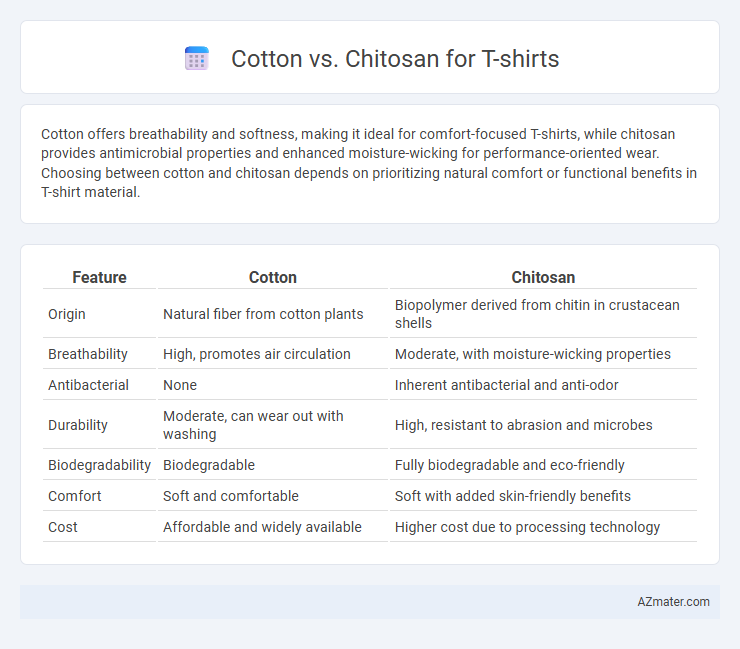Cotton offers breathability and softness, making it ideal for comfort-focused T-shirts, while chitosan provides antimicrobial properties and enhanced moisture-wicking for performance-oriented wear. Choosing between cotton and chitosan depends on prioritizing natural comfort or functional benefits in T-shirt material.
Table of Comparison
| Feature | Cotton | Chitosan |
|---|---|---|
| Origin | Natural fiber from cotton plants | Biopolymer derived from chitin in crustacean shells |
| Breathability | High, promotes air circulation | Moderate, with moisture-wicking properties |
| Antibacterial | None | Inherent antibacterial and anti-odor |
| Durability | Moderate, can wear out with washing | High, resistant to abrasion and microbes |
| Biodegradability | Biodegradable | Fully biodegradable and eco-friendly |
| Comfort | Soft and comfortable | Soft with added skin-friendly benefits |
| Cost | Affordable and widely available | Higher cost due to processing technology |
Introduction: Cotton vs Chitosan in T-Shirt Fabric
Cotton is a natural fiber widely used in T-shirt fabrics for its breathability, softness, and moisture absorption, making it ideal for comfort and durability. Chitosan, derived from chitin in crustacean shells, offers antimicrobial properties and biodegradability, providing enhanced hygiene and eco-friendly benefits. Comparing cotton and chitosan in T-shirts highlights the balance between traditional comfort and innovative functional performance in sustainable apparel.
Overview of Cotton: History and Properties
Cotton, cultivated for over 7,000 years, is a natural cellulose fiber derived from the cotton plant's seed hairs, known for its breathability, softness, and durability. Its versatility and moisture-absorbing properties make it a popular textile choice for T-shirts, providing comfort in various climates. Cotton fibers are hypoallergenic and biodegradable, contributing to its widespread use in apparel with a long-standing tradition in the global textile industry.
What is Chitosan? Origin and Characteristics
Chitosan is a natural biopolymer derived from chitin, which is primarily obtained from the exoskeletons of crustaceans such as shrimp and crabs. It is biodegradable, non-toxic, and possesses antimicrobial properties, making it an innovative material in textile applications. Unlike cotton, chitosan fibers offer moisture-wicking capabilities and enhanced durability, contributing to sustainable and functional T-shirt fabrics.
Sustainability: Environmental Impact Comparison
Cotton cultivation requires substantial water, pesticides, and land resources, leading to soil degradation and high carbon emissions, whereas chitosan production utilizes renewable marine waste, minimizing environmental footprint and promoting circular economy principles. Chitosan's biodegradability and antimicrobial properties reduce the need for chemical treatments during T-shirt manufacturing, further lowering ecological impact. Sustainable textile trends increasingly favor chitosan for eco-friendly apparel solutions that address resource conservation and waste reduction.
Comfort and Wearability: Feel and Breathability
Cotton offers superior breathability and softness, making it highly comfortable for everyday wear, while chitosan-infused fabrics provide antimicrobial properties without significantly compromising airflow. The natural fibers in cotton enhance moisture absorption, keeping the wearer cool and dry, whereas chitosan treatments add durability and odor resistance, enhancing overall wearability. Both materials balance comfort and function, with cotton excelling in softness and chitosan improving fabric longevity and hygiene.
Durability and Longevity of Cotton vs Chitosan
Cotton T-shirts offer moderate durability with fibers prone to wear and shrinkage after repeated washing, leading to a reduced lifespan. Chitosan-enhanced fabrics exhibit superior longevity due to their antimicrobial properties, resistance to microbial degradation, and enhanced mechanical strength. The integration of chitosan in T-shirts significantly improves durability, making them more resilient against environmental stresses compared to traditional cotton.
Antimicrobial and Odor-Resistant Features
Chitosan-treated T-shirts exhibit superior antimicrobial properties compared to traditional cotton, effectively inhibiting bacterial growth and reducing odors caused by sweat. Cotton fibers, although breathable and comfortable, lack inherent antimicrobial and odor-resistant features, often requiring chemical treatments to achieve similar effects. Chitosan's natural biopolymer structure provides long-lasting protection, making it ideal for activewear and hygiene-focused apparel where minimizing microbial activity and odor is essential.
Cost and Accessibility in the Market
Cotton T-shirts dominate the market due to their low cost and widespread availability, making them an affordable choice for consumers globally. Chitosan-infused T-shirts tend to be pricier, influenced by the specialized production process and limited supply chains. Accessibility of cotton fabrics far exceeds that of chitosan materials, which are still emerging in mainstream textile markets.
Fashion Trends: Design Versatility
Cotton remains a staple in T-shirt design due to its natural softness, breathability, and ease of dyeing, offering extensive color and pattern choices that align with diverse fashion trends. Chitosan, derived from chitin, introduces innovative properties like antimicrobial effects and improved moisture management, providing designers with functional versatility and promoting sustainable fashion. Combining chitosan with cotton fibers enhances durability and odor resistance, expanding creative possibilities in athleisure and eco-friendly apparel markets.
Conclusion: Choosing the Best T-Shirt Material
Cotton offers natural breathability, softness, and moisture absorption, making it ideal for everyday comfort in T-shirts. Chitosan provides antimicrobial properties and enhanced durability, appealing to those seeking functional and long-lasting apparel. Selecting the best T-shirt material depends on prioritizing comfort and natural feel with cotton or opting for advanced performance and odor resistance with chitosan.

Infographic: Cotton vs Chitosan for T-shirt
 azmater.com
azmater.com